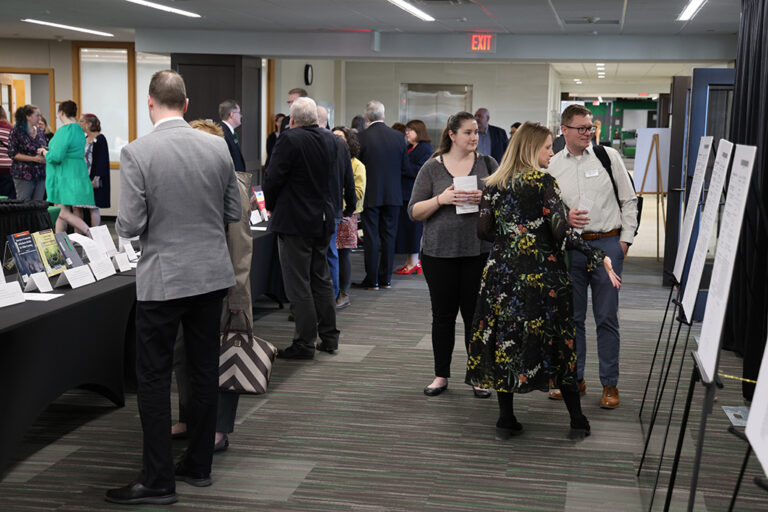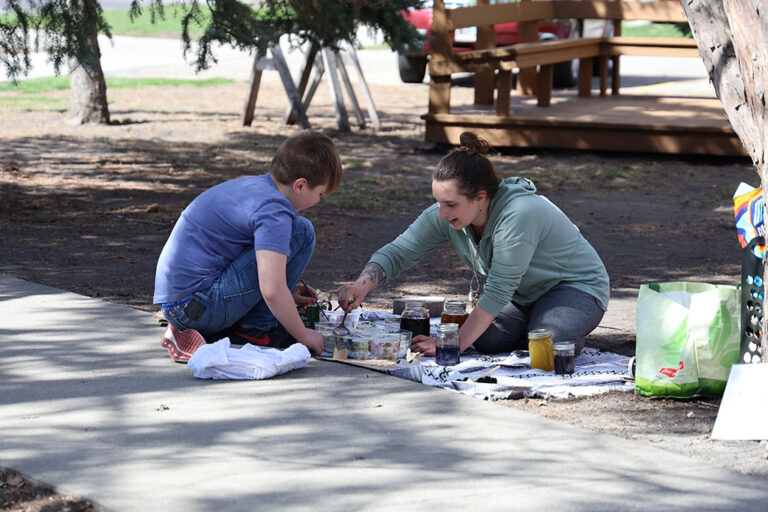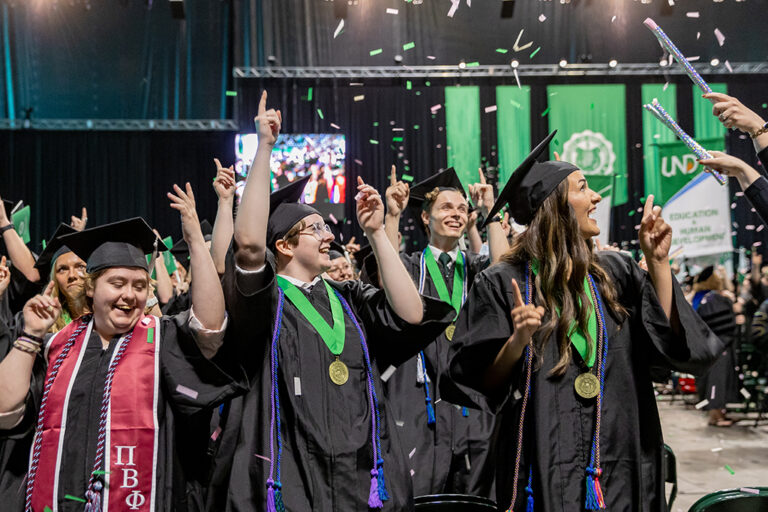UND celebrates MLK Jr.’s ‘beloved community’
Tomiko Brown-Nagin, Harvard Radcliffe Institute dean, served as keynote speaker for UND’s annual MLK Jr. Day celebration and brunch

“Injustice anywhere is a threat to justice everywhere,” Martin Luther King Jr. wrote as he sat in a Birmingham, Ala., jail cell in 1963. “We are caught in an inescapable network of mutuality, tied in a single garment of destiny.”
At the time, King’s appeal for nonviolent resistance and solidarity shaped the public’s view of the civil rights movement, changing the future of the nation. More than six decades later, UND’s community gathered to reflect on King’s legacy at the University’s annual Martin Luther King Jr. Day celebration.
On Jan. 15, the Office of Diversity & Inclusion held a gathering in the Memorial Union, which featured brunch, the start of a days-long, campuswide service project and several speeches, including a keynote by the dean of Harvard Radcliffe Institute.
“Today, we highlight the importance of forging bonds that transcend difference and working towards a society where every individual can not only survive but truly thrive,” said Stacey Barboa-Peterson, director of Student Diversity & Inclusion, shortly before keynote speaker Tomiko Brown-Nagin, dean of the Harvard Radcliffe Institute, took the podium.
King’s legacy and the law
The theme of this year’s event was the “beloved community,” King’s vision of a society that does not tolerate disenfranchisement and discrimination and instead, as King says, “caring and capacity drive political policies.”
To Brown-Nagin, the “beloved community” represents the “redemption and the reconciliation” America found as it eliminated segregation. Fittingly, the Harvard P.S. Paul Professor of Constitutional Law centered her keynote around how King used the law to advance the civil rights movement.
“One has to talk about law when one considers Dr. King and his legacy, because nonviolent resistance as a means of achieving social reform was really all bound up in the law,” she said.
King’s famous support of nonviolent protests, including the Montgomery Bus Boycott, was born from an understanding that nonviolent resistance held power and, importantly, exposed the amorality of the movement’s critics.
While conventional legal reform was pursued in court by civil rights figures such as Thurgood Marshall and Constance Baker Motley, the subject of a biography Brown-Nagin recently authored, King used the law as a rhetorical tool. It was a tactic of persuasion to convince the American public that desegregation was morally imperative, showing that the movement had a “moral high ground,” she said.

King’s strategy, which Brown-Nagin referred to as “moral suasion,” aimed to address discrimination ethically and legally by meeting the legal on its own terms, emphasizing the “self-evident” truths of the Constitution.
This coalition-building tactic was necessary, Brown-Nagin said, because King could only have made the progress he did with his community’s help.
“His rhetoric was really aimed straight at the American public, at members of Congress, at black communities,” said Brown-Nagin. “Convincing them that they were right to join his movement is a way of putting his opponents on the defense and bringing along the proponents of the movement.”
In his speeches, King referenced the Constitution and Declaration of Independence to argue that the exemption of the Black community from inalienable rights “violated the laws of man, as well as the laws of God.”
It was a strategy Brown-Nagin called “brilliant,” reflecting his genuine belief in America’s founding principles.
“He wasn’t asking, in other words, for any special favors. He was saying ‘Just be true to your own principles to your own laws,’” she said. “He’s invoking the law strategically, focusing on what was great about America, about the principles of America, in order to push for justice.”
King’s resistance toward breaking the law created tensions between him and other members of the Civil Rights Movement, said Brown-Nagin. Some civil rights advocates criticized his decision to turn back when efforts to stop a march from Selma to Montgomery in 1965 turned violent, and Judge Frank Johnson enjoined the protest.
Two days later, however, King would lead another march with the consent of the legal system. Later that year, King stood behind Lyndon B. Johnson as he signed the Voting Rights Act.
King and his allies’ efforts continue to have a lasting impact today. Today’s Congress, for example, is the most racially diverse in the nation’s history, which Brown-Nagin called a “progress narrative.”
But Brown-Nagin warned against complacency in the face of “forms of disenfranchisement that are reminiscent of the era of segregation,” citing challenges to Section 2 of the Voting Rights Act as recently as last year.
“It is up to us to create opportunity in the law and in society. It is up to we the people, we the citizens, we the voters. We have to fight to preserve the monumental social changes of the 1960s,” she said. “We have to preserve King’s legacy.”
Martin Luther King Jr. Social Justice Awards

Following Brown-Nagin’s speech, the Office of Student Diversity & Inclusion announced the four recipients for the 2024 Martin Luther King Jr. Social Justice Awards. The award recognizes individuals who demonstrate commitment to promoting social justice in the UND community.
Listed in the order they were announced, the awardees are:
Tomiko Brown-Nagin, dean of Harvard Radcliffe Institute and the event’s keynote speaker; Janelle Kilgore, vice provost for strategic enrollment management; Douglas Munski, professor of geography; Jaedon Hinds, programming assistant in the Office of Student Diversity & Inclusion.
A service project for our ‘beloved community’
In lieu of previous years’ Day of Service, the Office of Student Diversity & Inclusion planned a weeklong service project to recognize MLK Day’s designation as a National Day of Service.
In the spirit of the “beloved community,” the office invited the community to join them in packing kits of hats, socks, warming blankets and hygiene products for unhoused individuals in the Greater Grand Forks Community.
Though organizers scheduled the event to last through Friday, University and community volunteers completed the goal of packing 300 kits on Wednesday morning–just two days into the project–thanks to an outpouring of support.
“It was nice to see so many people come to the office to help,” said Precious Dada, a graduate programming assistant in the Office of Student Diversity & Inclusion. “We’ve always had a sense of community here, but we saw a lot of people from different areas of the University. It was a very friendly environment.”



